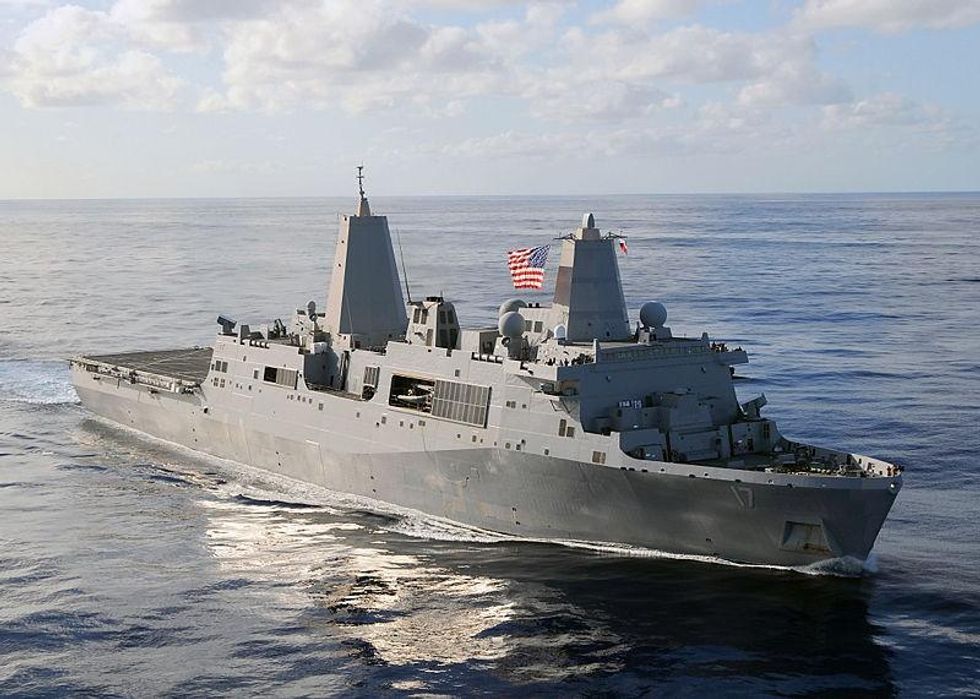Libyan Captive Faces Interrogation Aboard Floating US 'Black Site'
Move signals Obama administration use of warship prisons to deny legal rights

Abu Anas al-Libi--seized in a military operation in Libya over the weekend--is being held by the U.S. without access to a lawyer or notification of his legal rights.
U.S. officials told NBC News on Monday that he will face interrogations by the CIA, FBI, and military with the alleged aim of gaining information about al Qaeda's plans. U.S. officials say that al-Libi is being held under the laws of war and can therefore be detained as long as U.S. forces deem necessary, the Associated Press reports. The USS San Antonio, where al-Libi is captive, was initially deployed to the area for potential strikes on Syria.
A U.S. official speaking anonymously to the New York Times suggested that the very purpose of the raid and seizure was to carry out such interrogations. "If we can, capturing terrorists provides valuable intelligence that we can't get if we kill them," said the official.
President Obama has long criticized the George W. Bush administration's practice of whisking away "terror" suspects to secret prisons run by the CIA, known as 'black sites," where they were subject to indefinite detention, denial of their legal rights, and torture methods for interrogation.
Yet, the case of al-Libi reveals a growing trend within the Obama administration: floating 'black sites' aboard warships. Somali citizen Ahmed Abdulkadir Warsame was interrogated and denied his legal rights aboard a U.S. warship for two months in 2011 before he was brought to New York to face terrorism charges.
The capture of al-Libi, an alleged high-level al Qaeda operative, prompted immediate rebuke from the Libyan government, as well as from policy experts and peace campaigners concerned about shadowy military operations and denial of human rights as the 'war on terror' pivots to the continent of Africa.
The detention of al-Libi "appears to be an attempt to use assertion of law of war powers to avoid constraint and safeguards in the criminal justice system," Hina Shamsi, an attorney with the American Civil Liberties Union, told the Associated Press. "I am very troubled if this is the pattern that the administration is setting for itself."
Critics charge that indefinite detention, from Guantanamo Bay to U.S. warships, constitutes cruel and inhumane treatment. "[W]e know indefinite detention causes such severe, prolonged and harmful health and mental health problems for those detained [and] that it can constitute cruel, inhuman, and degrading treatment," declared Curt Goering, executive director of the Center for Victims of Torture, in a recent statement.
_____________________
An Urgent Message From Our Co-Founder
Dear Common Dreams reader, The U.S. is on a fast track to authoritarianism like nothing I've ever seen. Meanwhile, corporate news outlets are utterly capitulating to Trump, twisting their coverage to avoid drawing his ire while lining up to stuff cash in his pockets. That's why I believe that Common Dreams is doing the best and most consequential reporting that we've ever done. Our small but mighty team is a progressive reporting powerhouse, covering the news every day that the corporate media never will. Our mission has always been simple: To inform. To inspire. And to ignite change for the common good. Now here's the key piece that I want all our readers to understand: None of this would be possible without your financial support. That's not just some fundraising cliche. It's the absolute and literal truth. We don't accept corporate advertising and never will. We don't have a paywall because we don't think people should be blocked from critical news based on their ability to pay. Everything we do is funded by the donations of readers like you. Will you donate now to help power the nonprofit, independent reporting of Common Dreams? Thank you for being a vital member of our community. Together, we can keep independent journalism alive when it’s needed most. - Craig Brown, Co-founder |

Abu Anas al-Libi--seized in a military operation in Libya over the weekend--is being held by the U.S. without access to a lawyer or notification of his legal rights.
U.S. officials told NBC News on Monday that he will face interrogations by the CIA, FBI, and military with the alleged aim of gaining information about al Qaeda's plans. U.S. officials say that al-Libi is being held under the laws of war and can therefore be detained as long as U.S. forces deem necessary, the Associated Press reports. The USS San Antonio, where al-Libi is captive, was initially deployed to the area for potential strikes on Syria.
A U.S. official speaking anonymously to the New York Times suggested that the very purpose of the raid and seizure was to carry out such interrogations. "If we can, capturing terrorists provides valuable intelligence that we can't get if we kill them," said the official.
President Obama has long criticized the George W. Bush administration's practice of whisking away "terror" suspects to secret prisons run by the CIA, known as 'black sites," where they were subject to indefinite detention, denial of their legal rights, and torture methods for interrogation.
Yet, the case of al-Libi reveals a growing trend within the Obama administration: floating 'black sites' aboard warships. Somali citizen Ahmed Abdulkadir Warsame was interrogated and denied his legal rights aboard a U.S. warship for two months in 2011 before he was brought to New York to face terrorism charges.
The capture of al-Libi, an alleged high-level al Qaeda operative, prompted immediate rebuke from the Libyan government, as well as from policy experts and peace campaigners concerned about shadowy military operations and denial of human rights as the 'war on terror' pivots to the continent of Africa.
The detention of al-Libi "appears to be an attempt to use assertion of law of war powers to avoid constraint and safeguards in the criminal justice system," Hina Shamsi, an attorney with the American Civil Liberties Union, told the Associated Press. "I am very troubled if this is the pattern that the administration is setting for itself."
Critics charge that indefinite detention, from Guantanamo Bay to U.S. warships, constitutes cruel and inhumane treatment. "[W]e know indefinite detention causes such severe, prolonged and harmful health and mental health problems for those detained [and] that it can constitute cruel, inhuman, and degrading treatment," declared Curt Goering, executive director of the Center for Victims of Torture, in a recent statement.
_____________________

Abu Anas al-Libi--seized in a military operation in Libya over the weekend--is being held by the U.S. without access to a lawyer or notification of his legal rights.
U.S. officials told NBC News on Monday that he will face interrogations by the CIA, FBI, and military with the alleged aim of gaining information about al Qaeda's plans. U.S. officials say that al-Libi is being held under the laws of war and can therefore be detained as long as U.S. forces deem necessary, the Associated Press reports. The USS San Antonio, where al-Libi is captive, was initially deployed to the area for potential strikes on Syria.
A U.S. official speaking anonymously to the New York Times suggested that the very purpose of the raid and seizure was to carry out such interrogations. "If we can, capturing terrorists provides valuable intelligence that we can't get if we kill them," said the official.
President Obama has long criticized the George W. Bush administration's practice of whisking away "terror" suspects to secret prisons run by the CIA, known as 'black sites," where they were subject to indefinite detention, denial of their legal rights, and torture methods for interrogation.
Yet, the case of al-Libi reveals a growing trend within the Obama administration: floating 'black sites' aboard warships. Somali citizen Ahmed Abdulkadir Warsame was interrogated and denied his legal rights aboard a U.S. warship for two months in 2011 before he was brought to New York to face terrorism charges.
The capture of al-Libi, an alleged high-level al Qaeda operative, prompted immediate rebuke from the Libyan government, as well as from policy experts and peace campaigners concerned about shadowy military operations and denial of human rights as the 'war on terror' pivots to the continent of Africa.
The detention of al-Libi "appears to be an attempt to use assertion of law of war powers to avoid constraint and safeguards in the criminal justice system," Hina Shamsi, an attorney with the American Civil Liberties Union, told the Associated Press. "I am very troubled if this is the pattern that the administration is setting for itself."
Critics charge that indefinite detention, from Guantanamo Bay to U.S. warships, constitutes cruel and inhumane treatment. "[W]e know indefinite detention causes such severe, prolonged and harmful health and mental health problems for those detained [and] that it can constitute cruel, inhuman, and degrading treatment," declared Curt Goering, executive director of the Center for Victims of Torture, in a recent statement.
_____________________

